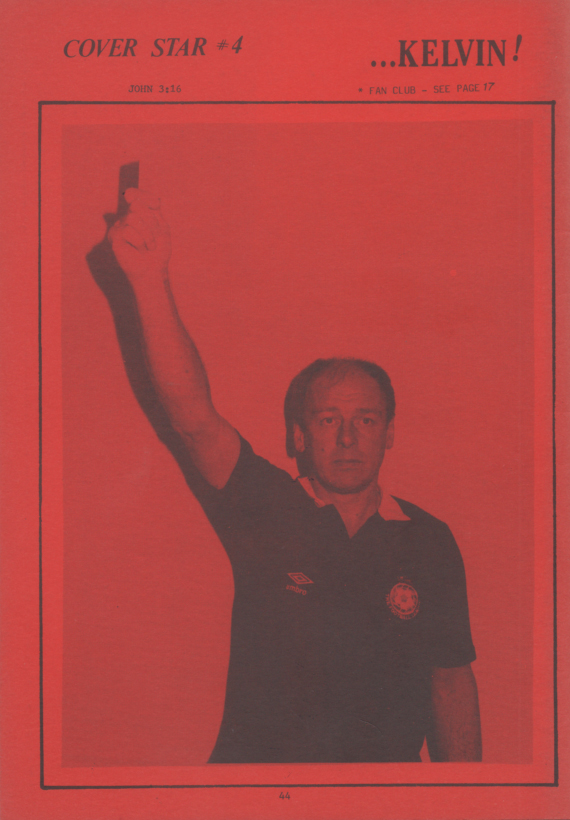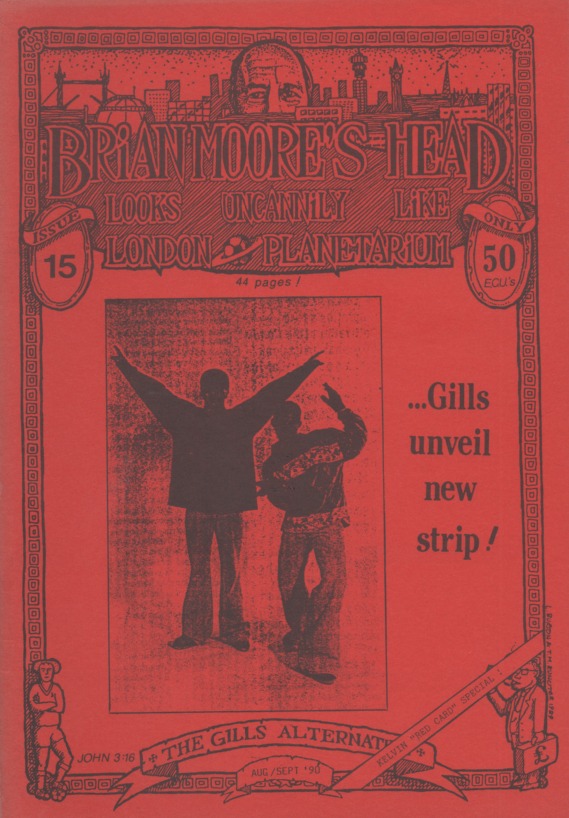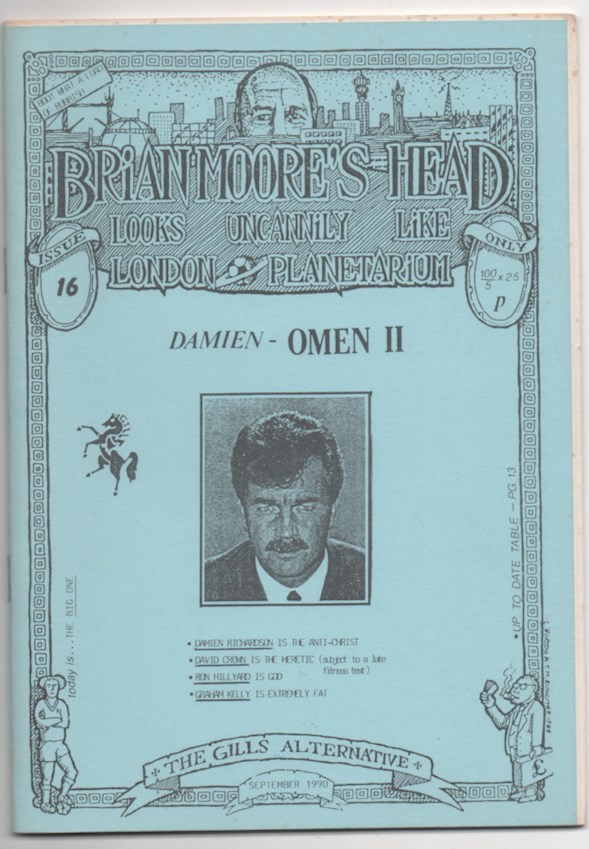During the early years of the fanzine’s life there would be an annual pre-season gathering of the editorial team, to discuss plans for the future development of the publication.
The meeting prior to the 1990-1 season took place in a Medway pub on a Saturday evening in July 1990, with four of us involved; Robin Halls, back from his year in exile undergoing teacher training in the north-east of England, Simon Baker, Chris Lynham and myself.
It was a fairly fraught affair, with the fanzine equivalent of ‘artistic differences’ resulting in disagreements. There were two of the quartet who were fairly easy-going as far as The Head was concerned, viewing such gatherings primarily as the opportunity to have a few drinks, with the discord tending to be between the other two. However, nothing took place to jeopardise the future of BMH.
The first issue of the campaign, number fifteen, contained 44 pages. One supporter, who asked if it still cost 50p, said, when told that it did, “Just like Gillingham, not going up this season”. It was available pre-season, with copies sold to some of the 968 who turned up at Priestfield for a 0-0 draw with an Australian XI on Friday 17 August. The editorial adopted a very positive stance, ‘As BMH enters its third season, there is more optimism around Priestfield than for many a long year. Hopefully this will carry over to the players, and we will be able to sustain a serious promotion bid this time around. It would also be nice if we were to put the upstarts from Watling Street firmly in their place and show them who is truly Kent’s premier side.’
Simon Chaplin continued his series of articles looking back at twenty-five years as a Gillingham supporter by focusing on Andy Nelson’s early seventies spell as the club’s manager. Nelson’s last season in charge, 1973-4, was memorable not only for the fact the Gills gained promotion from the bottom tier, but also because the club played several games on a Sunday during the second half of the campaign. The switch in weekend fixtures from Saturdays was due to the miners’ strike, which had caused the-then Prime Minister, Edward Heath, to instigate a three-day working week.
There were regular power cuts and the use of floodlights at football matches was forbidden unless clubs had, or were able to hire, their own generators. Our first Sunday game at Priestfield was on 20 January 1974, when a crowd of over 11,000 turned up for the visit of Crewe. Simon’s article included a newspaper cutting from the edition of the Chatham News that had been published two days before the Crewe match. Under the heading, ‘Churchmen OK Sunday soccer’, the article began, ‘Local churchmen are not raising protests at the start of Sunday soccer in the Medway Towns.’ One reverend said, “I cannot see any harm in it. The games are in the afternoon and need not interfere with anyone going to church”, whilst a rector in Strood’s opinion was, “This is an issue on which people should be allowed a free choice. In my opinion, Sunday is a day of rest, refreshment and recreation. Football, amateur or professional, falls into that category”.
One person featured who didn’t agree with Sunday football was seventy-year-old Cyril Dean, chairman of Medway’s Festival of Light, who was ‘not prepared to demonstrate, although he does not wholeheartedly approve’. Dean, a crusader against the permissive society, said, “It is not so much a question of Sunday soccer, but the fact that it can extend to include tennis, cricket, horse racing and other sports. This is just the thin end of the wedge. We are only in this mess because we have failed to keep the Commandments in the past. Every nation which has joined the permissive society in the last twenty years has become a third-rate nation and I believe that is what we have become”.

Legendary referee Kelvin Morton, now working as an assessor of match officials, who had been regularly mentioned in previous editions of BMH, due to his individual style of bewildering officiating, often featuring a plethora of red and yellow cards and penalty awards (he awarded five spot-kicks in a match between Crystal Palace, who missed three out of their four, and Brighton on Easter Monday 1989), featured as the back cover star in issue fifteen. Not only that, but the fanzine had decided to launch a fan club dedicated to the official, ‘Here at BMH we recognise greatness. Individuals who stand head and shoulders above the rest. Kelvin Morton is such a man. Over the past two years we’ve kept you informed of the progress of our favourite referee – a man whose firm handling of the game always proves an eye opener for the crowd.’
For £3, those joining would receive a specially commissioned photo of the great man, a club newsletter, membership card, selection of stickers, reproductions of two Kelvin cartoons and a scroll of honour, listing his major refereeing achievements.
Morton popped up in another article in the same edition, which detailed a few of the football-related dreams experienced by one of the fanzine’s editorial team, who, judging from the piece, surely had either a penchant for eating cheese late at night or a mind that worked in an extremely bizarre fashion. The writer mentioned that, towards the end of the previous season, BMH had obtained the list of officials for our remaining fixtures, and he believed that his Kelvin-related dream had been prompted by seeing that Morton was due in town to take charge of our match against Torquay.
The author wrote, ‘We were playing Aldershot away and Kelvin knew what we thought of him. Hence, he was out to entertain from the start, as he wore a white clown’s hat with black spots and, instead of a whistle, he had one of those hooters with a streamer thing which comes out of the end when you blow it (like you get at carnivals). He awarded Aldershot two penalties (for one foul, I think), both of which were saved. Then I started playing. Gillingham’s Tim O’Shea hacked someone and, inexplicably, I shouted for him to be sent off.
He was, but, much to my disgust, I was too. Despite (or, maybe because of) my absence, Gills won 2-0. At the end, Kelvin drove past the away end (which must have been where I had returned to after my dismissal) on a yellow dumper truck, grinning and waving all the way. Strange man.’ The article included the following footnote, ‘If this article does not appear in BMH 15, it is because it missed the typing deadline. The reason for this is that I had to move some tomato plants, which were performing badly, out of a shady part of the garden and into an area where they could receive the full benefit of the July heatwave. A cautionary tale to any would-be tomato growing BMH readers, I think you’ll agree (I would like to point out that they were not my plants – I don’t even like tomatoes particularly).’ The writer’s concerns were unfounded, with the deadline met and the article making it into issue fifteen.
With a lack of relevant picture material to break up the text in articles, Brian Moore’s Head chose to take the irrelevant route, with any old picture thrown into the mix. BMH15 included Noel Edmonds, a Tefal controlled cooker and John and Sarah Bertram of North Shields, who were celebrating their golden wedding anniversary.
The next edition of the fanzine was launched at the home match against Maidstone United on Saturday 22 September 1990, 8,004 seeing us lose at home to our Kent rivals, this time by a 2-0 scoreline. It included a review of the second ‘Planetarium Trophy’ five-a-side competition, which had taken place at the Black Lion sports complex during the summer, ‘bigger and better than last year, boasting fitter, faster and, in some cases, taller players and with no less than 50% of the competing teams wearing matching strip.’
Eight sides, compared to three in 1989, were involved, although three fanzines each entered two teams. There would have been nine, but the holders, Dartford’s ‘Light At The End Of The Tunnel’ pulled out on the morning of the tournament, as some of their players were unavailable, including one who had been taken ill at Leighton Buzzard. Not only were we down to eight teams, but the withdrawal left us without a trophy to present.
Other early obstacles included half of BMH’s first team arriving late, despite being the nearest to the Black Lion, with Sunday dinner ‘taking precedence over the footie in an absolutely scandalous reversal of priorities’ for one of the players, and the Black Lion reception staff insisting on a £5 deposit before they’d lend us a whistle. BMH1 failed to qualify for the semi-finals on goal difference. Back in action just fifteen minutes after our last encounter for the final group game, ‘the resulting weariness, combined with some over-exuberant challenges from (Maidstone fanzine) ‘The Foundation Stone’ and our lack of commitment due to the fact that we thought we had already qualified saw us go down rather meekly to a 6-1 defeat in the most bad-tempered and foul strewn game of the tournament.’ BMH2 finished bottom of their group, three defeats out of three and with a minus fifteen goal difference. Gillingham fanzine ‘The Donkey’s Tale’ won the tournament, their second team beating Tonbridge’s ‘Editor’s Foot 1’ side 5-0 in the Final, their task made easier as, due to time running out, the Tonbridge boys didn’t get much of a break following their semi final.
‘Moore Quotes’ included the following under the heading ‘Tony Pulis – A Tribute’, ‘So, Pulis finally left, after only 19 full appearances for the Gills. The official BMH response to his departure was, “Oh dear me. What a pity. What’s for tea?”’ Pulis made more of an impression when he returned as Gillingham manager in the summer of 1995.

For some footballers, rituals tend to assume great importance and, in player profiles, the question ‘Any superstitions?’ is often asked. There are those who like to be last out of the tunnel, some who have a particular routine, like putting on the left sock first, and others who always wear long-sleeved shirts. All nonsense of course, but an affliction that also affects supporters. The article ‘Superstitious Minds’ related the tale of an ‘unlucky hat’ worn by one Gills’ fan. Having made its début in our FA Cup defeat at Ipswich Town in 1985, the headwear’s second and third appearances were a disappointing 1-1 draw with Swansea and a 1-0 win over York, both our goals being last–minute efforts scored by Martin Robinson after the hat had been removed from the wearer’s head. It ended up meeting a watery end, the owner losing it in the River Medway after getting drunk on his eighteenth birthday.
One superstition is the lucky beard, when a person refuses to shave until a certain event happens, ‘At Christmas 1985, Gills embarked on an unbeaten league run, in the middle of which a BMH editor (who had obviously forgotten to shave that morning) rashly declared that he would retain his beard until we lost. Normally, this sort of promise would never result in more than a fortnight’s stubble but, not so on this occasion. He thought he was in line to lose his fluffy attachment in the cold at Wigan, but Mehmet’s late equaliser ensured the razor stayed put for a bit longer. Defeat finally came by way of a self-inflicted 2-0 reverse at York in March.’ Considering the then-imminent all-seater plans, the superstition that Gills always seemed to lose whenever any of the BMH team sat down at a game was destined to become more of an issue.
The author wrote, ‘The last time I suffered this fate was at Bolton in 1986 when we were compelled to sit as three coachloads of Oldham fans were in the visitors’ section (an unnecessary decision as Oldham fans seemed to hate Bolton and had come to support us, as their match at Blackburn had been postponed). We were top of the table and were thrashed 3-0.’ The superstition reached ridiculous proportions ‘at a friendly in Maidstone in 1987 when we built up a 3-0 half-time lead, but everyone sat on the terraces for the second half, due to the heat. It ended three each.’
The following appeared as a footnote to the piece, ‘The BMH editorial team found that during the World Cup Semi-Final (between England and West Germany), turning the TV over to ‘Shoestring’ at regular intervals would act as a stimulus to an England attack. Unfortunately, ‘Shoestring’ ended before the penalties, otherwise we would have been in the Final.’
